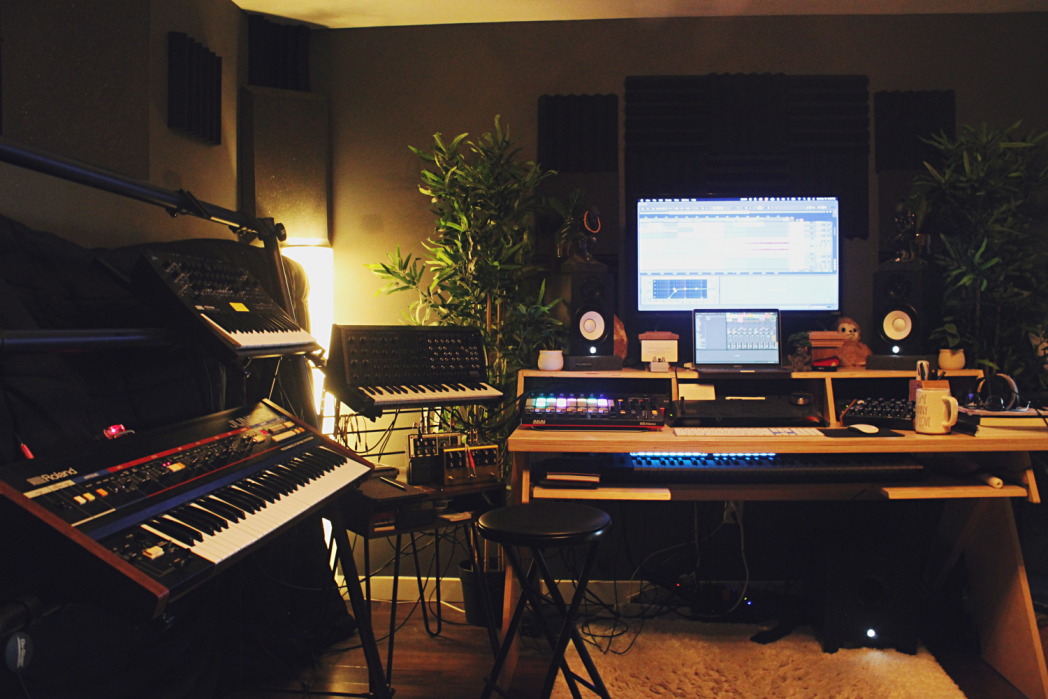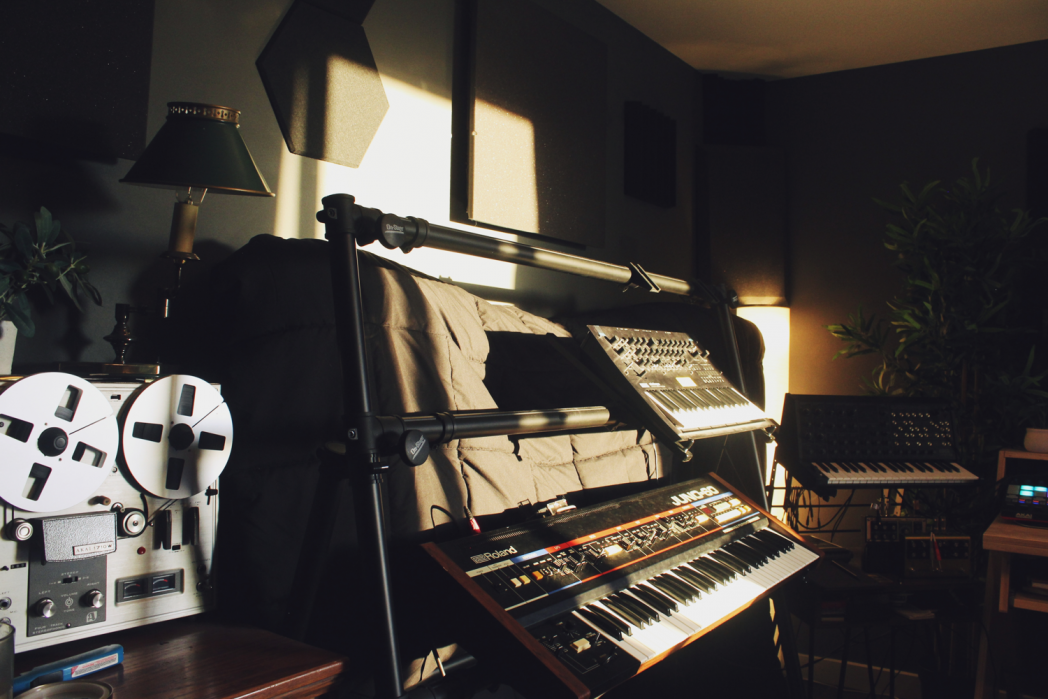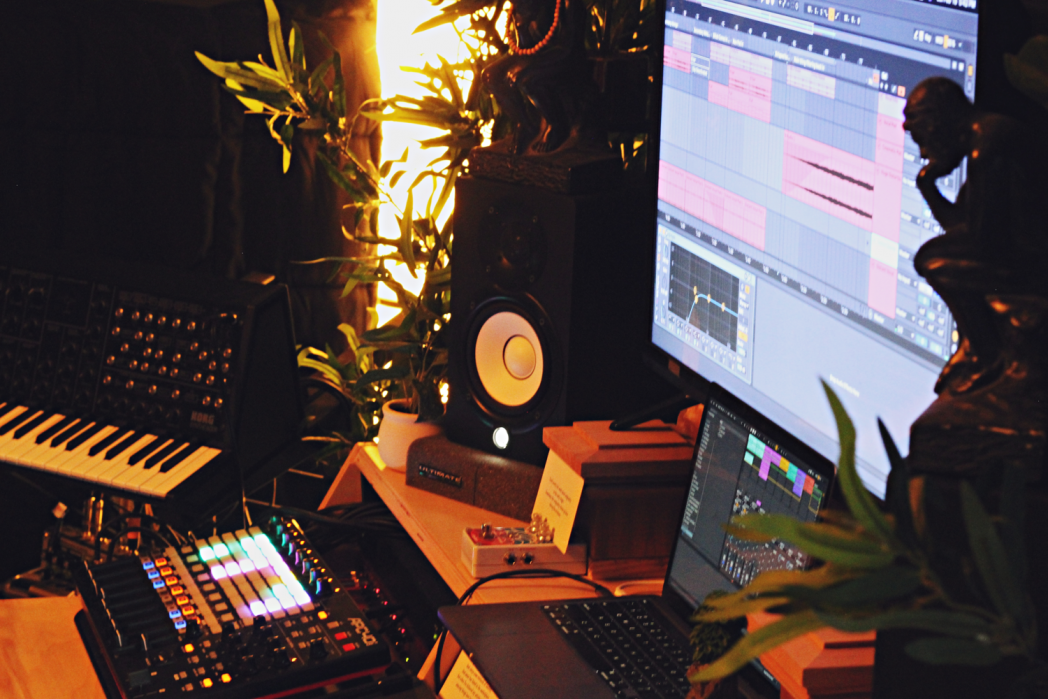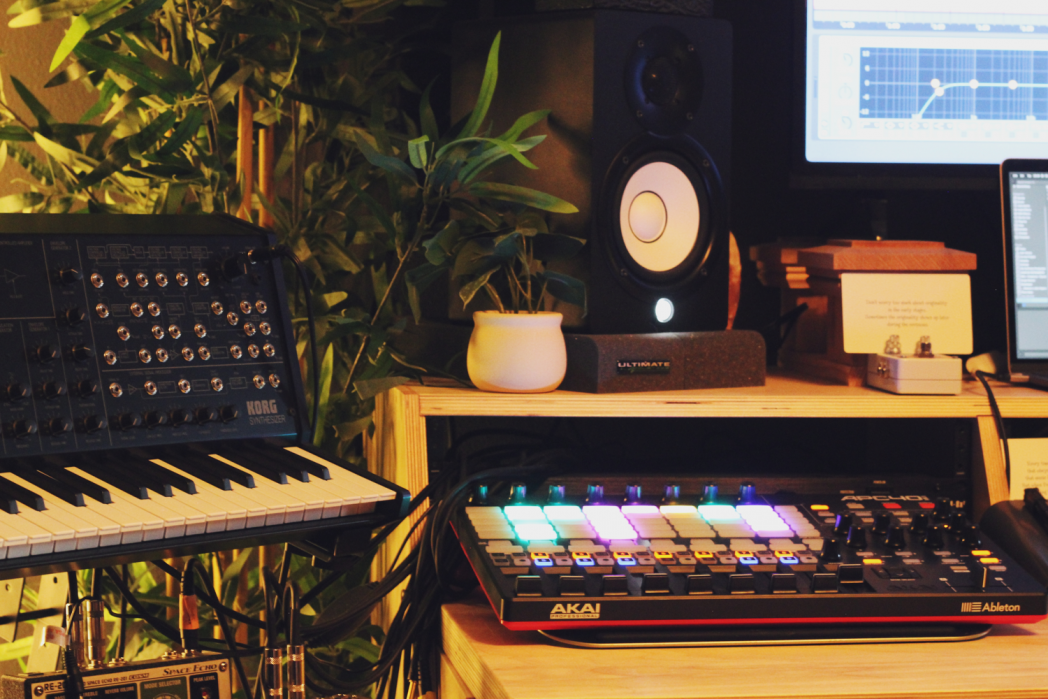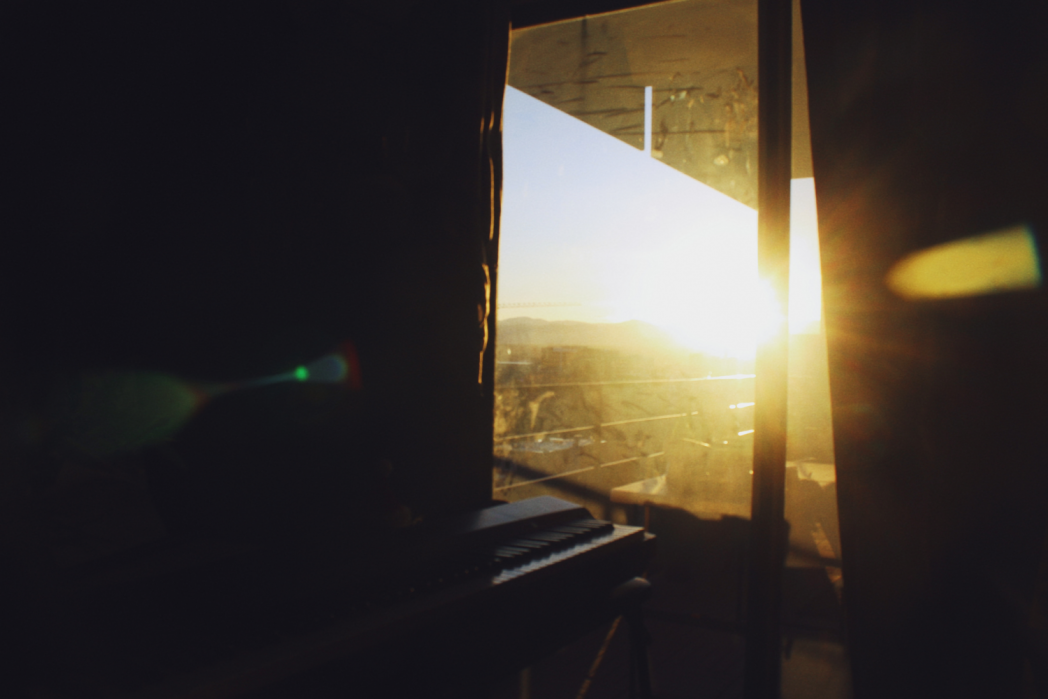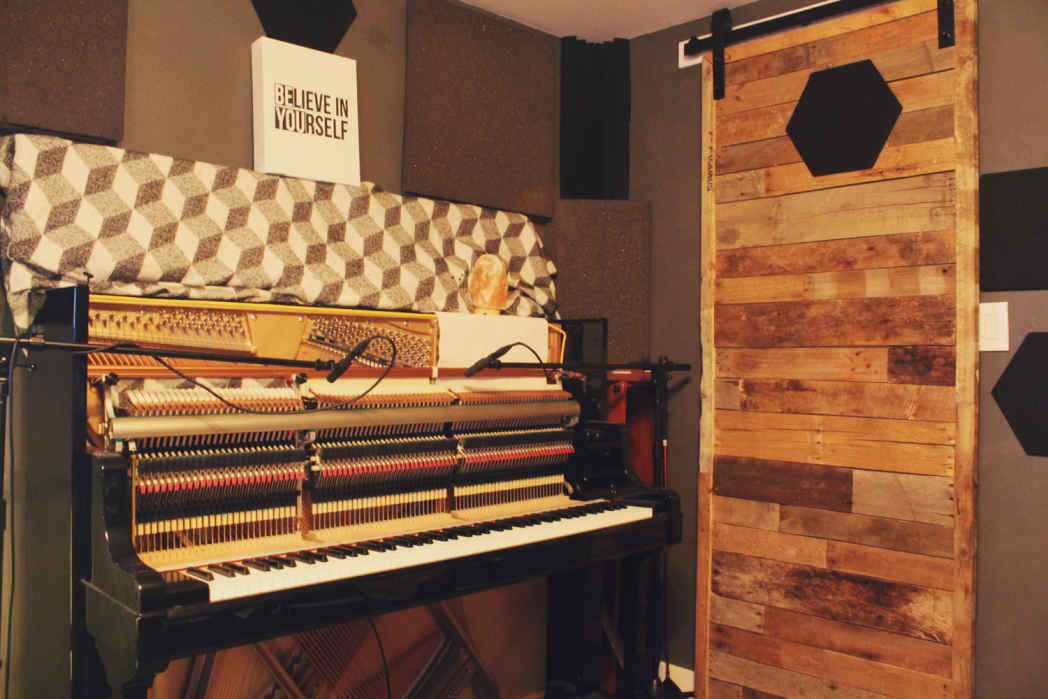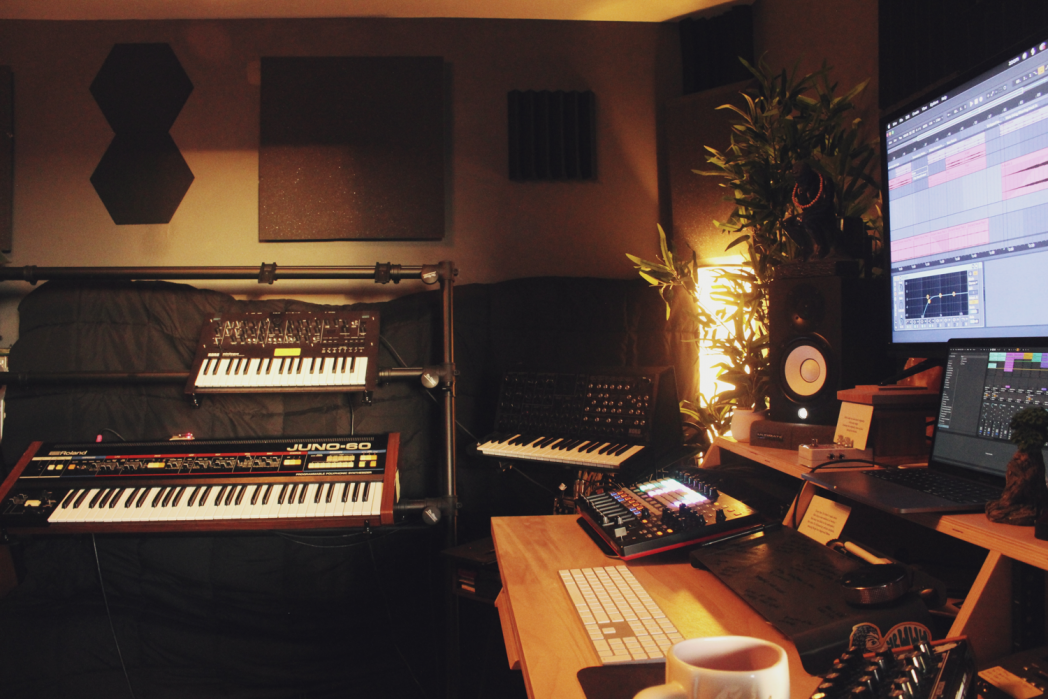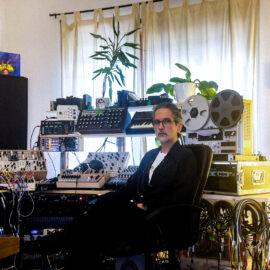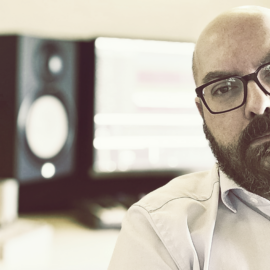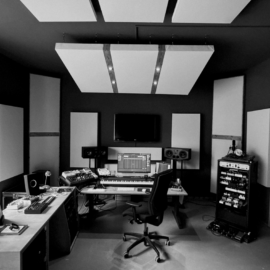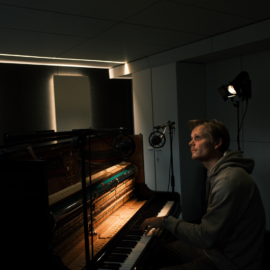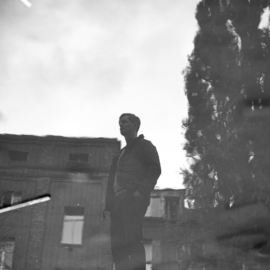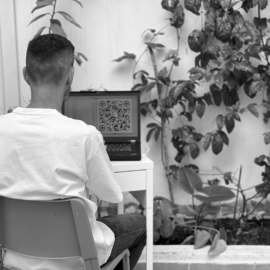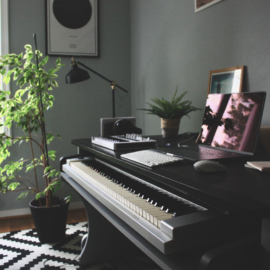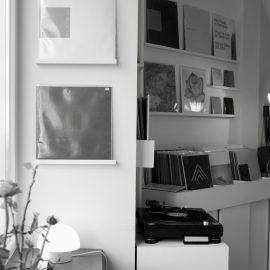Let’s start at the very beginning. Can you tell us how you got involved in composing, and what was your very first piece of gear?
I grew up playing the piano. Both my parents played the piano, and while I won’t say it was something that was ‘forced’ on me, I don’t really remember having a say in the matter. I was not a fan of lessons by any stretch and regularly would find myself getting in trouble with my instructors. Rather than practicing any material that was assigned to me, I would find myself trying to learn songs by ear from movies I had watched or other songs I had heard. This graduated to trying to come up with my own little versions of these songs that I was very excited to show my instructors, but they didn’t share the same excitement that I had blown off my assignment for the week. Eventually, I quit the traditional route and ended up getting a ‘BKE’ sampler shortly before going off to college. I would make little beats with it in GarageBand and then play little melodies over the top. While it’s found itself on quite a few ‘bad gear’ lists, I will say it opened up a lot of creative doors in my mind. I put music on hold for a while during college, and it wasn’t until the passing of a very close friend when I was 23 that I decided to rededicate myself and think about the potential of releasing my own music. I went all in at that point, learning as much as I could possibly retain about recording, production etc.
How many different studio iterations have you gone through, and what does your final setup look like right now?
I’m currently on a studio set up number three. I moved to Denver about a year and a half ago, and my new setup is very much streamlined for what I am doing right now. I’ve made a conscious effort over the past two years or so to make sure that everything in the studio has a purpose and, more importantly, gets used regularly to make music. If something has been sitting idly for a few months, I have no problem parting ways with it so it can go to a home where it will get some use. I think this is one of the important aspects of buying quality instruments to begin with since they retain value (for the most part.) That way, if you do decide to part ways, you can reinvest in something else that might inspire you in a new way. My current setup has my Juno-60, Korg MS-20, Moog Minitaur and Korg Minilogue all within arms reach. The Juno-60 has a MIDI retrofit which makes recording with it quite nice. I have a number of different effects pedals I like to run them through, some of my favorite being the Strymon Volante, OTO BAM, and the BOSS RE-20 Space Echo. My piano gets most of the love when it comes to outboard processing. I have a custom-built tube preamp from Rerun Electronics that I run a pair of Neumann KM184s into. I also have a pair of Klark Teknik Pultec clones with some upgraded tubes in them, which sound quite nice to my ears. Other than that, I am mainly ‘in the box’ in terms of processing.
Tell us about your favourite piece of hardware.
It would have to be my Juno-60. It’s simple, does everything I need it to and sounds fantastic. It seems to find a place on most of the tracks that I’ve written since I purchased it. What I love most about it, though, is its simplicity. I’ve owned a Rev2, Polybrute, Prologue, Summit, and some of those bigger poly synths. I loved them all, and I know they’re all capable of really awesome things and sound great. I just find myself spending too much time fiddling with them and not finishing any music. That is probably more so a lack of discipline on my end at the time of owning them, but the Juno really reinforces the idea that limitations can be a positive thing. I saw a quote recently that I really liked: “Limitations don’t limit your creativity; they focus it.”
And what about the software that you use for production?
I use Ableton for all my production these days. I used to work regularly in Logic, but I demoed Ableton a few years back, and something about it just clicked for me. Not to mention the amazing ability it has for sound design and idea generation, especially when you start introducing Max for Live devices into the equation. I’ve heard a lot of talk about Bitwig lately, and I am sure that I would enjoy that, but at this point, I know Ableton very well and don’t see myself switching any time soon.
Is there a particular piece of gear that you’re just dying to get your hands on, and do you think one day you’ll have it?
Having said what I said about the Juno and its simplicity, something that I’ve had my eyes on since it was released is the Moog One. My only hesitation is that I wouldn’t get the most out of it to justify the price tag, and it would probably also mean me parting ways with some other gear. Sonically I know I would love it, but it’s something I would need to make sure I’m ready for, if that makes sense. Maybe one day I’ll be able to pick one up, but for now, I’m quite comfortable with the gear I have.
Can you please share some aspects of sound design in your work?
I like to write over drones a lot. What I’ve been doing a lot recently is taking a vocal sample and running it through PaulXStretch with some of Ableton’s LFOs running to create some movement. I like the idea of creating a sonic bed to lie down in, especially in the early stages of a track. Sometimes I’ll remove the drone altogether as the initial ‘spark’ and ‘space’ to write in was all it was needed for. Ableton’s LFOs are all over the place when I am working. I love their ability to bring an atmosphere or a space to life by adding some movement and variation. I’ll have dedicated sessions where I’ll just see what I can assign them to and see what kind of interesting sounds I can create. Creating spaces for my music to exist in is something I spend a lot of time on.
Any particular new techniques that you tried out for your new album?
On the Twinsleep album, a lot of the ideas were born from improvs I did on an old harmonium I restored shortly before the pandemic. Unfortunately, I had to leave that instrument back in Minnesota when I moved to Denver. Some others were from leftover stems from Maxy and my ‘Borealis’ album that we released back in 2020. There’s a lot of repurposing and resampling going on throughout the album, which I really love. Maxy and I started releasing music somewhat around the same time, so it’s been fun to sort of ‘grow up’ together musically. Being able to hear and encourage each other as we progress has been really fun.
What does your live setup look like, and what do you bring with you when you travel for an extensive tour?
There is no live setup currently, which is something I’m hoping to change in the near future. That has been a real goal of mine, and I’ve been working on a lot of music lately that I can hopefully integrate into a live performance sometime soon.
What is the most important environmental aspect of your current workspace, and what would be a particular element that you would improve on?
For me, it’s the view and some natural light. I am fortunate enough to have a beautiful view of the Rocky Mountains from my studio window. I always find it incredibly inspiring to look out the window and see the sun illuminating the mountains in the morning or setting behind them at night. It’s something that I really try to be conscious of and never take for granted. Something that I’ve gotten better at over the years but can always improve on is limiting distractions in the studio. I either like to leave my phone outside the studio when I am working or put a block on all social media apps if I need to have it in there with me.
What can you tell us about your overall process of composition? How are the ideas born, where do they mature, and when do they finally see the light?
It really depends on the project that I am working on. Most of the time, it starts with some experimentation, maybe a new mic position, maybe some interesting processing on a synth, or improving on the piano. It’s one of those things where I know it when I hear it. Once an idea grabs me, I try to work as quickly as possible. I want to stay in that initial moment of excitement about an idea for as long as I can. That sort of ‘flow state’ you can get into when you are chasing an idea is everything to me. At that point, there is no ‘right or wrong’; it’s purely about throwing ideas out and seeing if I can create something I want to pursue further. Sometimes the ideas end up not holding up, but I like to think I have a good ability to recognize when something is worth moving forward with. If I come back a few sessions later and it isn’t grabbing me the same way it initially did, I have no problem letting it go and moving on to the next thing. I write quite a lot of music that never ends up seeing the light of day, but I at least try to get to a rough arrangement to give the ideas a shot. Sometimes you need to have that full song structure in place to see what the track is missing. Once I’ve compiled a decent amount of tracks, I’ll listen through them and decide on the ones I want to get into the weeds with. Once I move into the finer details of a track, I like to use timers a lot. I find when I give myself a certain amount of time to accomplish these more technical tasks, I am a lot more intentional with my actions. Once a track has gone through this sort of ‘slow process of elimination’ it is typically when it arrives at a release stage.
After the piece is complete, how do you audition the results? What are your reactions to hearing your music in a different context, setting, or sound system?
I have a few friends to whom I will often send pieces out once they’re complete for some feedback. I like to bounce the track out and upload it to SoundCloud so I can take a walk and listen to it in a separate context from the DAW. Another thing I like to do is have someone in the room with me when I am playing the track. I don’t ask them for feedback at all, but you really listen to a track differently when there is someone else in the room with you. It helps you identify parts that are dragging, perhaps or maybe if a section is rushed. Before moving to Denver, I used to be the resident pianist at the Minneapolis Airport, and I would play a lot of my tracks there to test them out as well.
Do you ever procrastinate? If so, what do you usually find yourself doing during those times?
I try not to, but it really is inevitable from time to time. I try to be at least mindful about it, though, and recognize when it’s happening. I think the problem is when you start to lose track of time, and then the whole day has passed by. I try to be as organized as possible and have a plan for what I want to accomplish each day and studio session. If I do catch the procrastination bug, though, it’s usually watching sports or some skiing videos.
What gets you inspired?
Hearing new music, discovering new artists. Wondering, “How did they do that?” or “I wish I would have thought of that!” It could be a certain sound or rhythm, or pattern. It’s funny, but that is such a driving force for me. I love to take that momentum into the studio then and start to experiment, and that’s how a lot of new ideas are born.
And finally, what are your thoughts on the state of “electronic music” today?
I think it’s in a pretty good state overall. I feel like I’m always stumbling across some new music that sounds unique in its own way. I’m not quite sure what to think about all these new AI developments, but that could be a whole different conversation in itself…
